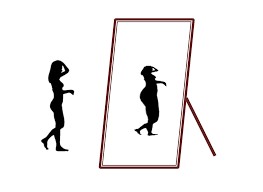What is OSFED?

Carrying on from my previous blog posts that discuss eating disorders in general, anorexia nervosa, bulimia, and binge eating disorder (BED), this one will discuss the most common yet arguably most unknown eating disorder; other specified feeding or eating disorder, also known as OSFED. It can be argued that when many people think of eating disorders, they think of anorexia and bulimia. Binge eating may be viewed as an eating disorder by many as well now, but the severity of it may not be widely known. In my opinion, I think OSFED would not be known to many people, which is why it is important to find out more about it. OSFED is used to describe when a person’s symptoms do not exactly match the symptoms of the other three eating disorders. However, it is still as serious as the others and treatment is needed to help with it.
It is common for symptoms of eating disorders to not exactly fit the diagnostic criteria for anorexia, bulimia, or binge eating disorder, and so when this happens OSFED is diagnosed, and accounts for a big percentage of all eating disorders. Examples of OSFED include; purging disorder, where a person purges to affect their weight/shape, but it isn’t part of a binge and then purge cycle; atypical anorexia, where a person has the symptoms of anorexia but their weight remains within a normal range for them; binge eating disorder, but a limited duration/low frequency so the binges don’t occur often or over a long length of time; night eating syndrome, where a person repeatedly eats at night, which could be them eating a lot of food after they have eaten their evening meal, or after waking up from being asleep; and bulimia, but a limited duration/low frequency, where the person has the symptoms of bulimia, but the binge/purge cycles don’t occur as often or over a long length of time.
It is not always easy to know if someone has an eating disorder, and like with anorexia, bulimia, and BED, any of their symptoms can be part of OSFED, which also have the same risks and potentially harmful effects. A person’s behaviour is likely to be the first thing other people see change, before any physical effects are noticed, and these include a person being tired, have low self-esteem and low confidence, having a poor image of their body, having mood swings and being irritable, having difficulty in concentrating, and being self-conscious when they eat in front of others. They may also exhibit secretive behaviour or have a preoccupation with food.
Like with other eating disorders, the way a person deals with food and eating is not the only factor; their underlying thoughts and feelings are also part of it because the disorder could be a way of them being able to cope, and a way of them feeling that they are in control. There isn’t a generic treatment plan for OSFED because people’s circumstances are very different, and so a specialist team will take into consideration the individual needs of the person to create one. As with the other eating disorders, the first step of seeking treatment is usually through making an appointment to see a GP, who can then make a referral to an eating disorder specialist or team.
There is a lot of support and help available for all types of eating disorders, with a link to such support in the references section, along with further information of the possible treatments that could be used to treat OSFED. All types of eating disorders are serious mental health conditions and deserve to be treated in the same way as any other mental health issue, and so by outlining exactly what they are and what causes them, hopefully they can be understood more by the people who have them, as well as the people around them.
Sarah Keeping MBPsS MSc PgDip GDip BA (Hons) Cert HE
Follow Sarah on twitter at @keepingapproach, facebook at @keepingapproach, and on instagram at @thekeepingapproach
Follow E-therapy on social media:
Facebook – @Etherapy
Instagram – @EtherapyToday
Twitter – @EtherapyToday
References
https://www.nhs.uk/conditions/eating-disorders/
https://www.beateatingdisorders.org.uk/types/osfed
https://www.beateatingdisorders.org.uk/support-services/helplines
https://www.beateatingdisorders.org.uk/types/osfed/treatment



